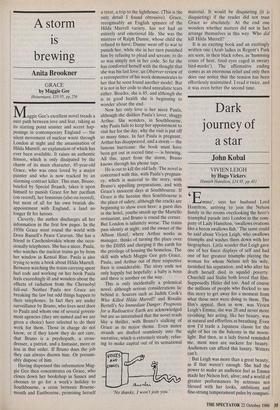A storm is brewing
Anita Brookner
GRACE by Maggie Gee
Heinemann, £10.95, pp.256
Maggie Gee's excellent novel treads a sure path between love and fear, taking as its starting point sinister and secret hap- penings in contemporary England — the silent movement of nuclear waste through London at night and the assassination of Hilda Murrell, no explanation of which has ever been available. It raises an authentic frisson, which is only dissipated by the charm of its main character, 85-year-old Grace, who was once loved by a major painter and who is now tracked by an alarming contract killer. This man, Bruno, briefed by Special Branch, takes it upon himself to punish Grace for her pacifism (on record), her feminism (also on record), but most of all for his own brutish dis- appointment with England, a land no longer fit for heroes.
Cleverly, the author discharges all her information in the first few pages. In the 1950s Grace went round the world with Dora Russell's Peace Caravan. She has a friend in Czechoslovakia whom she occa- sionally telephones. She has a niece, Paula, who watches the nuclear trains go by from her window in Kensal Rise. Paula is also trying to write a book about Hilda Murrell. Between watching the trains carrying spent fuel rods and working on her book Paula feels exceedingly ill and wonders about the effects of radiation from the Chernobyl fall-out. Neither Paula nor Grace are breaking the law but odd things happen to their telephones. In fact they are under surveillance by Bruno, who lives next door to Paula and whom one of several govern- ment agencies (they are named and we are given a choice) have selected to do their work for them. Those in charge do not know, or if they know they do not care, that Bruno is a psychopath, a cross- dresser, a patriot, and a fantasist, more or less in that order. If Bruno does the job they can always disown him. Or presum- ably dispose of him.
Having dispensed this information Mag- gie Gee then concentrates on Grace, who closes down her bookshop in Sussex and chooses to go for a week's holiday to Southboume, a cross between Bourne- mouth and Eastbourne, promising herself
a treat, a trip to the lighthouse. (This is the only detail I found obtrusive). Grace, recognisably an English spinster of the Hilda Murrell variety, has not had an entirely arid emotional life. She was the mistress of Ralph Dunne, whose child she refused to have; Dunne went off to war to punish her, while she in her turn punished him by refusing to plead and scream; to do so was simply not in her code. So far she has comforted herself with the thought that she was his last love; an Observer review of a retrospective of his work demonstrates to her that he soon found another model. But it is not in her code to shed unrealistic tears either. Besides, she is 85, and although she is in good health she is beginning to wonder about the end.
Now her only love is her niece Paula, although she dislikes Paula's lover, shaggy Arthur. She wonders, in Southbourne, why Paula fails to keep her appointment to visit her for the day, why the visit is put off so many times. In fact Paula is pregnant, Arthur has disappeared, and a storm — the famous hurricane: the book must have been got out in record time — is brewing. All this, apart from the storm, Bruno knows through his phone taps.
He is out to kill the old lady. The novel is concerned with this, with Paula's pregnan- cy, which is material to the story, with Bruno's appalling preparations, and with Grace's innocent days at Southbourne. If Grace is the heroine then Southbourne is the place of safety, although the cracks are beginning to show even here: a guest dies in the hotel, youths smash up the Martello restaurant, and Bruno is round the corner. But London is infinitely worse. The trains pass silently at night, and the owner of the Albion Hotel, where Arthur works as manager, thinks of turning the place over to the DHSS and charging it the earth for the privilege of housing the homeless. The skill with which Maggie Gee gets Grace, Paula, and Arthur out of their respective fixes is considerable. The story ends not only happily but hopefully: a baby is born and there is another on the way.
This is only incidentally a polemical novel, although serious considerations lie behind it. Sources such as Judith Cook's Who Killed Hilda Murrell? and Rosalie Bertell's No Immediate Danger; Prognosis for a Radioactive Earth are acknowledged but are so internalised that the novel reads like a thriller, with Bruno's stalking of Grace as its major theme. Even minor strands are drafted seamlessly into the narrative, which is extremely steady, refus- ing to make capital out of its sensational
`No thanks, I won't join you.' material. It would be disquieting (it is disquieting) if the reader did not trust Grace so absolutely. At the end one wonders whether matters did not in fact arrange themselves in this way. Who did kill Hilda Murrell?
It is an exciting book and an excitingly written one (Arab ladies in Regent's Park are seen, in their black robes, as 'humming cones of heat, tired eyes caged in sweaty bird-masks'). The affirmative ending comes as an enormous relief and only then does one notice that the tension has been effortlessly maintained. I read it twice, and it was even better the second time.


































































 Previous page
Previous page